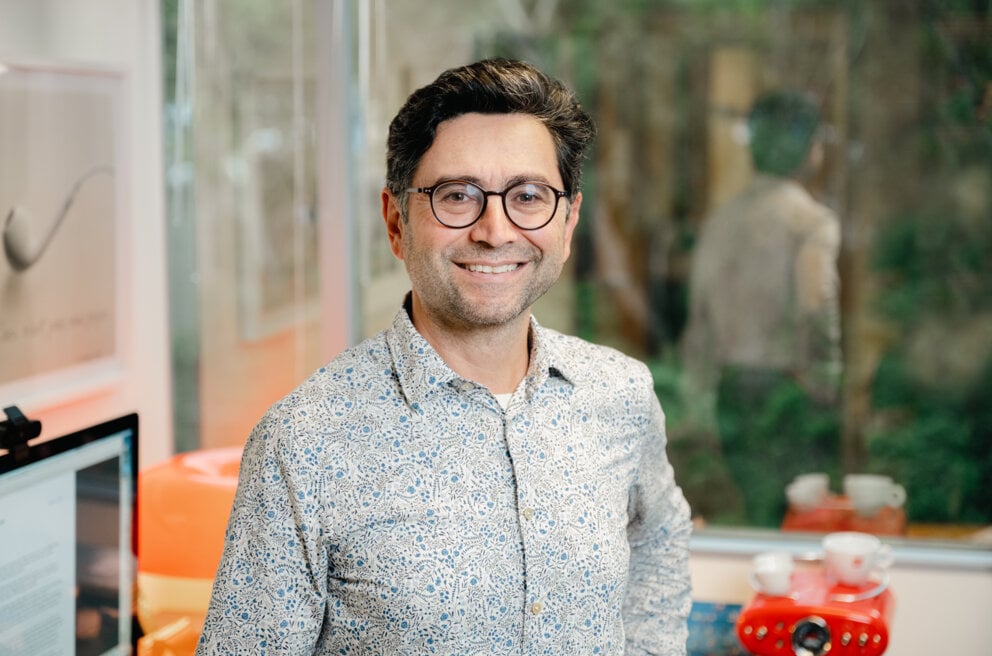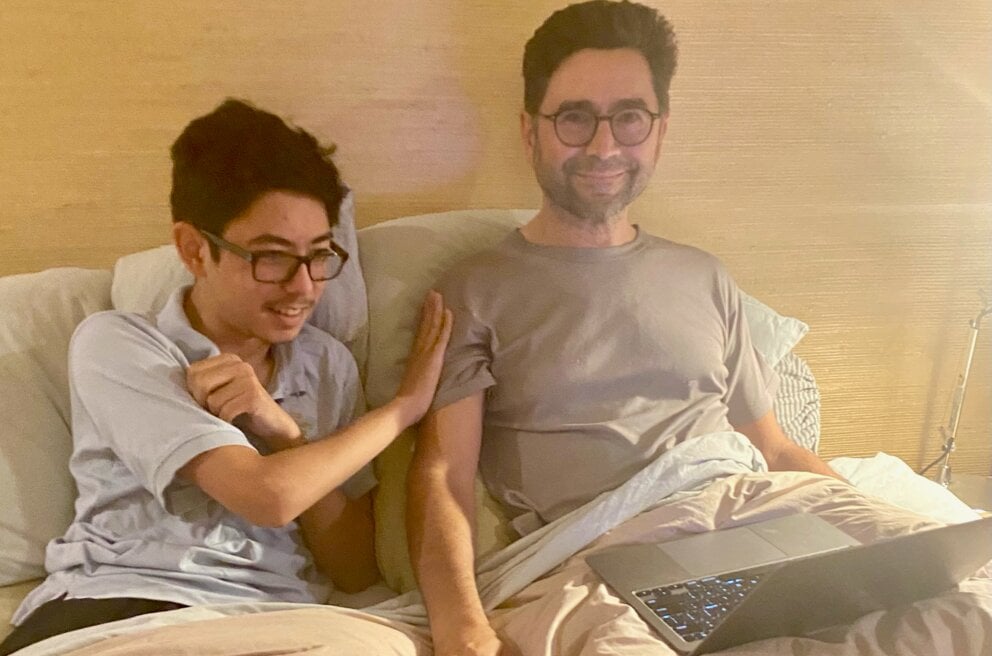Ardem Patapoutian
Interview
Interview, February 2022

Ardem Patapoutian in the lab.
Photographer: Walter Wilson and The Collective, 2021
“I found my tribe among scientists”
On 28 February 2022 nobelprize.org spoke to Ardem Patapoutian about his journey to the United States, what it takes to become a successful scientist and his love of playing the trumpet (even though his two cats don’t love it as much).
Telephone interview, October 2021
“I had ‘do not disturb’ on my phone actually, so I didn’t get his phone calls”
Telephone interview with Ardem Patapoutian following the announcement of the 2021 Nobel Prize in Physiology or Medicine on 4 October 2021. The interviewer is Adam Smith, Chief Scientific Officer of Nobel Prize Outreach.
As Ardem Patapoutian says, sometimes the familiar can yield the best surprises. When it comes to figuring out how our senses work, the sense of touch “was kind of the big elephant in the room.” Patapoutian had his phone on Do Not Disturb when Stockholm tried to call him but he got the news, via his dad, just in time to watch the press conference, sitting in bed with his son Luca. He was caught there to record this brief call moments after the public announcement of his Nobel Prize in Physiology or Medicine, and he describes how finally finding the sensors that allow cells to detect pressure has opened up whole new unexpected vistas of phenomena that are governed by sensitivity to touch. As he reflects, “Nobody ever could have thought that pressure sensing is related to these processes.”
Interview transcript
Adam Smith: Oh hello, am I speaking with Ardem Patapoutian?
Ardem Patapoutian: Yes, speaking.
AS: Hello, my name’s Adam Smith. I’m calling from Nobelprize.org, the website of the Nobel Prize.
AP: Hello there.
AS: Hi. First of all, many, many congratulations on the award of the Nobel Prize.
AP: Thank you so much.
AS: What was it like getting the call from Thomas Perlmann?
AP: It was… I had ‘do not disturb’ on my phone actually, so I didn’t get his phone calls, and then he somehow found my father’s, who’s 92 years old, lives in Los Angeles, and he called me. And so I heard it from him, which was very special.
AS: [Laughs] It’s nice that your 92-year-old father knows how to bypass your do not disturb.
AP: [Laughs] Yes, it is, indeed. I’m watching the video feed right now of the announcement.
AS: Would you like to watch it or is it okay to talk for a couple of minutes?
AP: We can talk for… quickly.
AS: The pressure receptors that you’ve discovered. We’ve taken our ability to sense pressure for granted for all of humanity’s existence. It’s quite amazing that you’ve actually located the gatekeepers for this. What was it, do you think, that led you to ask the right question to get to the answer?
AP: As you said, in science many times it’s the things that we take for granted that are of high interest. And us being in the field of sensing touch and pain, this was kind of the big elephant in the room where we knew they existed, we knew they did something very different than how most other cells communicate with each other, which is through chemicals, and it was a difficult question to answer, because technically it was… it was difficult. But you’re right in the sense that just identifying that this was a big unknown and ignored, you know, things like sense of proprioception, your sense of where your limbs are compared to your body, most people don’t even think about that’s an important sense. Without it you cannot walk, you cannot… you cannot stand up, and so it’s a very important part of physiology.
AS: Yes, because the focus will be on touch very much, and that’s what we’ve all missed during lockdown I suppose, but of course these pressure receptors control many things – blood pressure, as you say, proprioception.
AP: Absolutely, and one of the exciting things about it is that it’s taking us into directions and places where we didn’t know that pressure sensing was important, and that’s one of the exciting things in the future.
AS: What’s an example of one of those things?
AP: So, for example, we have found that red blood cells can sense pressure and adjust their volume. And in clinical settings when you have too much of this sense you can actually have dehydrated red blood cells that is protective against malaria. We also have found that in immune cells this protein regulates things like how much iron there is in your blood. Nobody ever could have thought that pressure sensing is related to these… to these processes.
AS: How wonderful. Last question – what’s… what do you think the secret of your successful research environment is?
AP: It’s two in the morning, it’s difficult to say very intelligent things right now, but I think it’s the environment, the people around you, and just to, kind of, focus on big questions that can be answered. In science, many times we focus on the big questions, but you have to ask it at the right place, and the right time, where the tools are present to answer those questions.
AS: Thank you. I think that was a very intelligent answer for any time of the day, let alone 2am, so… [Laughs] Thank you very, very much indeed for talking to me.
AP: Thank you. Nice talking to you.
AS: Lovely talking to you, thank you, congratulations.
AP: Bye, bye.
AS: Bye, bye.

Ardem Patapoutian watching the press conference from Nobel Forum just after the Nobel Prize call on 4 October 2021.
Photographer: Nancy Hong
Did you find any typos in this text? We would appreciate your assistance in identifying any errors and to let us know. Thank you for taking the time to report the errors by sending us an e-mail.
Nobel Prizes and laureates
Six prizes were awarded for achievements that have conferred the greatest benefit to humankind. The 12 laureates' work and discoveries range from proteins' structures and machine learning to fighting for a world free of nuclear weapons.
See them all presented here.
